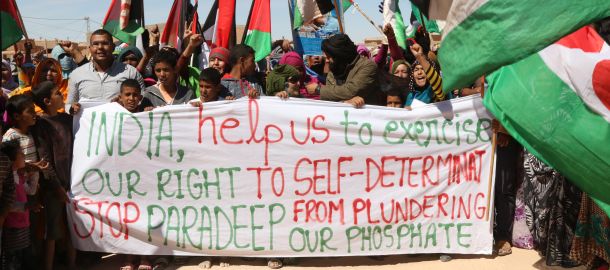
The Swedish mining equipment company Epiroc has announced that it will no longer supply the controversial Bou Craa phosphate mine in occupied Western Sahara. German company Continental should follow the example, WSRW comments.
The 12-year long practice of Swedish companies supplying drilling equipment to the operation of the controversial Bou Craa mine in occupied Western Sahara has come to an end.
"We do not have any agreements for maintenance or supply for the Boucraa mine in Western Sahara and we have no plans to supply the mine in the future", VP Corporate Responsibility, Camilla Goldbeck-Löwe, wrote in an email to Western Sahara Resource Watch (WSRW) on 8 September 2020. WSRW has since received confirmation from several sources verifying this information.
Epiroc is a rather new Swedish company, established in 2018. The company was created as a result of a decision of the Swedish company Atlas Copco to split out its former business of mining equipment. At the time of the split, Atlas Copco had been selling and servicing equipment to the controversial mine in Western Sahara for several years. Its first sales to the operation took place in 2008, and the deal was revealed by WSRW only in 2013.
Though Atlas Copco and Epiroc did not comment on the matter for a long time after Epiroc’s establishment, it was a common understanding among the owners of both companies that the contract with OCP had been taken over by Epiroc, as was the case with other Atlas Copco contracts. A letter to Epiroc in November 2019 was not responded to, but when confronted by Business and Human Rights Resource Centre earlier this year, the company stated that it was "looking into this issue at present".
However, a tweet from Atlas Copco on 10 April 2019 led to confusion as to which company was actually holding the contractual obligation. Atlas Copco stated on social media that "the extraction of phosphate made by our customer follows the rules of international law". The tweet is still online.
Now, also Atlas Copco is clear that neither company plays a role in the mine. "Atlas Copco has no operations in Western Sahara. The customer for the Bou Craa mine and Atlas Copco has agreed that there will be no new orders for delivery of equipment, spare parts and service to Western Sahara", Atlas Copco's Vice President Sustainability, Sofia Svingby, wrote WSRW in a mail on 18 September 2020. This was confirmed to Business and Human Rights Resource Centre in a letter 9 March 2020. "Atlas Copco has no operations in Western Sahara. The mining equipment business is now part of a separate publicly traded company, Epiroc AB. [...] There is no service performed by Atlas Copco personnel in Western Sahara", the company wrote at the time.
Western Sahara Resource Watch now calls on German company Continental - supplying rubber belts for the mine's important conveyor infrastructure - to follow the example set by the Swedish company. Continental's several year long contract for supplies to the conveyor belt system expired in July 2020. WSRW does not know whether it has been renewed.
"We ask Continental to come clear and state what has happened to the expired contract with OCP. Epiroc has shown that it is perfectly possible for a company to maintain commercial operations in Morocco, while at the same time avoiding supplies to the Bou Craa mine in occupied Western Sahara. A Moroccan state-owned company has no right to operate a phosphate mine in Western Sahara without obtaining the consent of the people of the territory. By contributing the mine's operations, international companies are aiding the illegal occupation. Continental should now follow the example of Epiroc, and immediately and unconditionally express that it has ended its involvement. We congratulate Epiroc for showing responsibility and taking the lead", stated Tim Sauer from Western Sahara Resource Watch in Germany.
Other companies supplying the mine on the occupied land are Siemens, Caterpillar and Worley Ltd.
It is not the first time that restructuring of companies has led to a tidying-up in Western Sahara controversies. In 2018, the large German group Dr.Oetker sold off its shipping division Hamburg Süd to Danish container giant Maersk. Hamburg Süd's UK subsidiary Furness Withy was at the time the charterer behind transports of phosphates to Australia/New Zealand. As Maersk's acquisition of Hamburg Süd was completed, Maersk made sure to discontinue the Oceania transports. Furness Withy was the charterer behind the bulk vessel NM Cherry Blossom that was detained in South Africa for illegally shipping the conflict mineral out of the occupied territory.
New report: Western Sahara phosphate trade halved
The export of phosphate rock from occupied Western Sahara has never been lower than in 2019. This is revealed in the new WSRW report P for Plunder, published today.
New report on Western Sahara phosphate industry out now
Morocco shipped 1.93 million tonnes of phosphate out of occupied Western Sahara in 2018, worth an estimated $164 million, new report shows. Here is all you need to know about the volume, values, vessels and clients.
New report on global phosphate trade from occupied Western Sahara
Over 200 million dollars worth of phosphate rock was shipped out of occupied Western Sahara last year, a new report from WSRW shows. For the first time, India is among the top importers.
Atlas Copco claims Morocco's phosphate plunder is legal
The Swedish industrial group that in recent years has refused to answer questions on its participation in Morocco's phosphate plunder in Western Sahara now claims the exploitation of the conflict mineral is legal.



